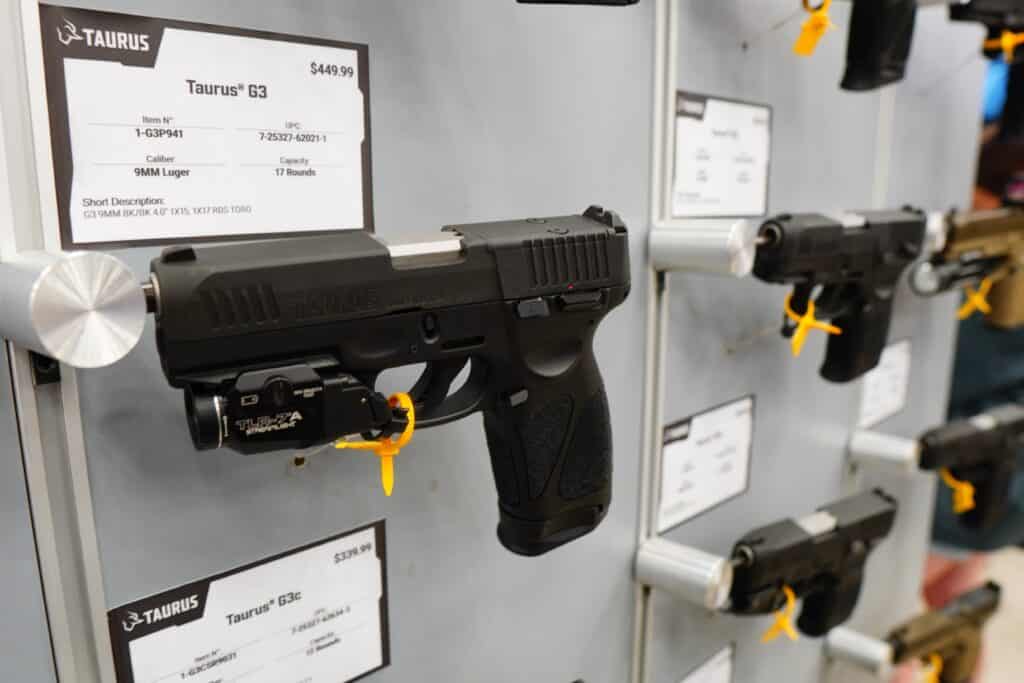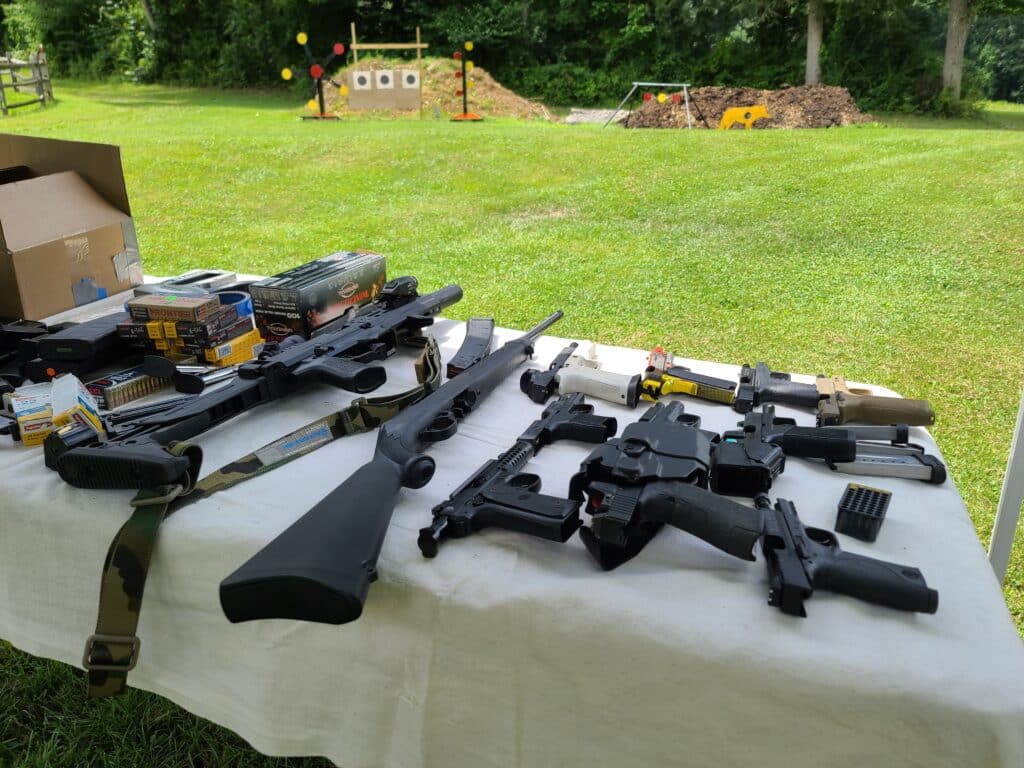We’ve seen several states respond to the Supreme Court striking down their restrictive gun-carry laws last year by passing new restrictions that seem ripe to get struck down too. New York, New Jersey, and Maryland have all pushed through Bruen-response bills. California and Hawaii are looking to do the same.
But nobody is considering a new law nearly as expansive as what Massachusetts lawmakers are currently trying to move through their statehouse. It has all the gun-carry restrictions the other states have enacted, including the ones that have already been found unconstitutional by several federal judges. But it also mandates “smart gun” technology in all new guns once a version is commercially available, expands the state’s “assault weapons” ban, ups registration requirements, bans the sale of unserialized gun parts and even magazines, and so much more.
Contributing Writer Jake Fogleman looks through the details of the bill’s proposed text.
I also lay out how my latest charity range day went while I was up on the farm in Pennsylvania yesterday. And I quote several experts who have identified what may be a significant weakness in the gun law the Supreme Court is poised to examine in its next term.
Plus, crime analysis Jeff Asher joins the podcast to talk about the huge murder rate decline.

Analysis: What’s in the Massive Massachusetts Gun-Control Bill [Member Exclusive]
By Jake Fogleman
Thus far, Massachusetts has lagged behind most of its formerly may-issue counterparts in passing a replacement gun-carry law following last June’s Bruen decision. Now, Bay State lawmakers appear prepared to compensate for that delay by enacting a response bill far broader than any of its predecessors.
Massachusetts Representative Michael Day (D.) introduced HD 4420 late last month. The 140-page bill seeks to completely overhaul that state’s gun laws to address, in his words, “a rogue Supreme Court” and “increasingly sophisticated criminal activity” in the state.
“While the Commonwealth’s gun laws are among the best in the nation, unrelenting acts of violence and the Supreme Court’s deleterious Bruen decision demand legislative action both here in Massachusetts and on the Federal level,” Massachusetts House Speaker Ron Mariano (D.) added, according to the Boston Herald.
The gun-rights world has reacted to the bill with horror. The NRA declared the bill “unprecedented” in its scope, while the Gun Owners Action League, a Massachusetts gun rights group, has taken to calling the bill the “Lawful Citizens Imprisonment Act.”
With such strong conviction attached to either side of the bill, it’s important to understand what the current text of the bill does and does not do.
Carry Restrictions
Like the other Bruen response bills, HD 4420 seeks to overhaul Massachusetts’ regulations on applying for, obtaining, and using a concealed carry permit.
On the front end of the application process, the bill in its current form does not alter application fees or the duration of a carry permit’s validity—which remain $100 and six years, respectively. However, it does add live fire and a written exam to the required curriculum for any training course to meet state standards. It spells out a process for the Massachusetts State Police to determine the exact specifications of the training course at a later date.
Once a permit is issued, the bill creates many new sensitive places where licensed carry is prohibited, similar to those enacted in New York, New Jersey, Maryland, and Hawaii. It would make it a crime punishable by up to $1000 in fines and two and a half years in prison to possess a firearm, loaded or unloaded, in or upon the grounds or parking areas of any government building, polling place, educational institution, and any private property unless the owner affirmatively provides consent for licensed carry on the premises.
New “Assault-Style Firearm” Restrictions
The bill expands the state’s already extensive restrictions on so-called assault-style weapons by broadening the state’s definition of banned guns to include any semi-automatic rifle, pistol, or shotgun that can accept a detachable magazine and has one or more listed cosmetic features, any “semiautomatic version of any fully automatic firearm,” any “automatic part,” and an extensive list of hundreds of firearms listed by make and model. The state’s previous ban merely listed banned “assault weapons” by make and model, in addition to prohibiting any “copies or duplicates” of said guns as determined by the discretion of the Attorney General.
The bill outlaws the possession, transfer, and sale of affected weapons and does not grandfather any owned or legally purchased after September 13, 1994. “Large capacity” magazines, defined as those capable of holding more than ten rounds, are also totally banned unless they were continuously owned before September 13, 1994. In this case, the owner can continue to possess them but may not use them unless on private property or at a licensed gun range. They can also transfer authorized large-capacity magazines to an heir, a licensed dealer, or someone in another state as long as they report the transaction.
Violators of the newly-construed ban on assault-style weapons and large-capacity feeding devices could face up to $10,000 in fines and ten years in prison for a first offense, and up to $15,000 in fines and 15 years in prison for subsequent offenses.
Targeting “Ghost Guns”
In an attempt to crack down on homebuilt guns, the bill would prohibit the possession or sale of any unserialized firearm, defined liberally to include parts like frames, receivers, and even barrels, as well as non-lethal options like stun guns. It also bans possession of unserialized magazines even though magazines are not sold with serial numbers.
It mandates that any gun owner wishing to make a firearm or magazine obtain a unique serial number for each before final assembly. Then, within seven days of completing the firearm or ammunition feeding device, the gun owner would be required to register it with the state department of public safety.
New Registration Requirements
The bill would require the registration of any firearm or “feeding device” with the state Department of Criminal Justice Information Services, which would be tasked with documenting the name, address, and contact information of the registrant; license or permit type, number, and expiration date for registrant; manufacturer, make, model, caliber, and serial number of each firearm or feeding device; date each was acquired; name and address of source from which each was obtained, including the name and address of the prior owner if there was one; and a statement signed by the registrant under the penalty of perjury that they are properly licensed and not otherwise prohibited from owning a firearm.
It also requires notification of any “additive manufacturing.”
“Smart Gun” Mandates
The text of section 61 of the bill appears to mandate smart guns as the only viable option for sale once they become available. It says any gun that doesn’t have “mechanical locks or devices designed to recognize and authorize, or otherwise allow the firearm to be discharged only by its owner or authorized user, by solenoid use-limitation devices, key activated or combination trigger or handle locks, radio frequency tags, automated fingerprint identification systems or voice recognition, provided, that such device is commercially available, shall be defective…”
It further stipulates that any entity that sells a non-smart gun once the state decides they are “commercially available” is liable for any death or personal injury caused by the firearm. Although, it also exempts law enforcement and the military.
Storage Requirements
The bill requires that all firearms—including gun parts, stun guns, and chemical sprays like mace—be “secured in a locked container” when not in use.
It defines safe storage as a container that “must be capable of being unlocked only by means of a key, combination or similar means and it must be able to deter all but the most persistent from gaining access.” A locked storage room would not qualify, and gun dealers would be required to follow the requirements as well.
It also requires that all firearms be unloaded and in a locked container during transportation.
Changes to Permit-to-Purchase procedures
The bill modifies the state’s existing Firearms Identification Card (FID)—which currently is required to purchase, possess, and transport “non-large-capacity” rifles, shotguns, and ammunition—into a “long gun permit” designed for the purchase and possession of “common long guns,” defined as non-large-capacity rifles and shotguns that are not semi-automatic. Any resident 18 years and older, or any resident aged 15-17 with the permission of a parent, may apply for the long gun permit.
The change makes it so that only residents in possession of a license to carry, which are limited to those 21 and older, may purchase semi-automatic long guns in addition to handguns. As such, the permitting change is a de facto ban on semi-automatic gun ownership for those younger than 21.
The bill’s new restrictions and mandates extend further and include dozens of new bureaucratic requirements for government agencies tracking firearms data, new requirements for gun retailers, and new obligations for recognized firearms trainers.
In sum, while the bill incorporates many of the same carry restrictions passed in other states looking to rebel against the Supreme Court, its scope goes far beyond the other Bruen response bills conjured thus far. If it passes, expect to see this bill tied up in court for the foreseeable future, where many of its provisions will likely fare poorly under the Bruen test its proponents are looking to buck.
Podcast: Is the Murder Rate Finally Falling? (Featuring Crime Analyst Jeff Asher) [Member Early Access]
By Stephen Gutowski
This week, we’re taking a closer look at the data that indicates the murder rate is finally on a downward slope. And there’s no better guest to have than the man who has documented the decline.
Crime analyst Jeff Asher joins the show to give us insight into his methodology for tracking murder across the country. His numbers show what could be a historic reversal of the recent murder spike. The data from over 100 city police departments indicate murder may be down as much as 10 percent.
But Asher also explains the limitations of real-time data as well as the continuing problems with the FBI’s data collection. Still, he says trends in even a few cities can be broadly predictive nationwide. And what he’s seeing is backed up by other measures as well.
Of course, not every city is improving, and Asher highlights standout cities going in either direction.
Plus, Contributing Writer Jake Fogleman and I talk about the downturn in gun sales. And we have another member segment!
You can listen to the show on your favorite podcasting app or by clicking here. Video of the episode is available on our YouTube channel. Reload Members get access on Sunday, as always. Everyone else can listen on Monday.
Homes For Our Troops Range Day
Yesterday, I went up to Pennsylvania to do my latest charity shoot. Carter, the winner of the most recent Homes For Our Troops charity auction drove from the exact opposite side of the state up by Lake Erie to get some trigger time in. He brought a couple of his own guns and his friend Chris.
We were able to shoot an incredible variety of guns. Handguns, rifles, and shotguns. Even a Sears-made ghost gun (my semi-auto shotgun that lacks a serial number because it was made before the Gun Control Act of 1968)!
Reload Member, family friend, and all-around great guy Merrill Walters hosted the range day as he has done in the past. He let us use his farm and outdoor range to put hundreds and hundreds of rounds on target. His collection of steel targets was the star of the show–in one case literally because he has a Texas star that’s just too much fun to shoot. I’m forever grateful for his help because it would be much harder to show Chis and Carter a good time without it!
All of Carter’s winning bid goes directly to Homes For Our Troops. They use that money to build specialized homes for disabled soldiers. If you’re able, you should consider donating your time or money to the group!

Some Experts See an Achilles’ Heel in Gun Law Facing Supreme Court Scrutiny [Member Exclusive]
By Stephen Gutowski
Academics and scholars who study the Second Amendment are uncertain about how the Supreme Court’s latest gun case will come out. Most who talked to The Reload think the Court will uphold the law being challenged, but a few say there’s a little-known and potentially-irreconcilable weakness.
Late last month, the Supreme Court agreed to hear United States v. Rahimi. It deals with whether the federal ban on those subject to domestic violence restraining orders possessing guns is unconstitutional. A Fifth Circuit panel said it is, but most experts recently told The Reload they expect the Supreme Court could go the other way.
Still, none of them were entirely sure. And several brought up one particular aspect of the federal prohibition that could ultimately doom it: the fact it is achieved via a civil proceeding that provides fewer due process protections than criminal trials.
George Mason University professor Robert Leider, a former clerk for Justice Clarence Thomas who now teaches at the Antonin Scalia Law School, noted the federal law in question details two different standards for what qualifies as a domestic violence restraining order.
“The federal ban includes two prohibiting circumstances: either the restraining order must have ‘a finding that such person represents a credible threat to the physical safety’ of a family member or the restraining order must ‘by its terms explicitly prohibit the use, attempted use, or threatened use of physical force’ against a family member,” he said.
Leider argued the first circumstance has at least some historical backing, a key metric in the Supreme Court’s Bruen test for gun cases.
“There is a common-law tradition of requiring those for whom there are credible threats that they will commit acts of violence against others, including close family members, to post sureties that they will keep the peace,” he said. “And on the failure to post such sureties, they could be temporarily jailed.”
But he argued the other kind of restraining order is “more problematic.” Mark W. Smith, former law professor and author of First They Came for the Gun Owners: The Campaign to Disarm You and Take Your Freedoms, agreed and went further. He said the constitutional footing for the second type of restraining order is completely unstable.
“If you are subject to a 922 g8 restraining order, you have not necessarily been convicted of a crime or anything; you’re just subject to a restraining order that involves you and someone that’s an intimate partner–could be a wife, ex-wife, ex-girlfriend, child, someone in the home, somebody connected to you domestically,” Smith said. “And that could be almost rubber-stamped anywhere in America that simply says that you and your intimate partner, your ex-spouse, whatever it is, you each have to go to a separate corner. Neither of you can get close to each other. You’re going to talk through lawyers. That’s it. That’s what we’re gonna do. These are entered every day all across America. One of the issues here is, of course, these are done, in most instances, without any kind of real procedural protections of anyone’s liberty, including the right to keep and bear arms.”
Leider court concerns over the due process questions predate even those of the Second Amendment claims at issue in the case.
“It will be interesting to see the government’s justification for why any restraining order that prohibits domestic violence should trigger a complete ban on possessing firearms, even when the order was not issued on the basis of finding that a credible threat existed to a family member,” he said. “The Fifth Circuit, long before Heller was decided, was troubled by that provision.”
In Mr. Rahimi’s case, the Fifth Circuit panel said his particular restraining order met both of the requirements to trigger a gun ban under the federal law. The order was issued in part because he was explicitly accused of assaulting the mother of his child. But, as Leider noted, the panel took issue with the lower due process protections involved in issuing the order–regardless of whether Mr. Rahimi was explicitly accused of being dangerous.
“Rahimi’s domestic violence restraining order satisfied both conditions; but it bears emphasis that the order at issue here was entered by agreement, in a civil proceeding, after Rahimi apparently waived hearing (the order states no formal hearing was held, and no record was created), and without counsel or other safeguards that would be afforded him in the criminal context,” Judge Cory T. Wilson wrote for the panel.
The Supreme Court may find the same deficiencies with the law that the Fifth Circuit panel did, even with Mr. Rahimi being specifically found dangerous. Or they may choose to uphold the sturdier aspect of the law while tossing the weaker provision. Of course, it is also possible they don’t do either.
UCLA law professor Adam Winkler, author of Gunfight: The Battle over the Right to Bear Arms in America, argued it’s hard to see the Court handing down a decision that lets Mr. Rahimi out of his conviction.
“Honestly, I just think as a matter of realpolitik, I just don’t see the Supreme Court saying it’s unconstitutional to ban domestic abusers from possessing firearms,” he said. “That just seems highly, highly unlikely that that’s going to be the conclusion of a majority of justices.”
Smith conceded Rahimi is not one he’d prefer to be the first Second Amendment case taken up in the wake of last year’s Bruen decision. He said a case about whether non-violent felons should be prohibited for life, such as the Third Circuit’s Range v. AG, would probably make more favorable ground for gun-rights advocates. But, unlike Winkler, he isn’t convinced the Court will uphold Mr. Rahimi’s conviction.
“If you asked me, frankly, would I rather see the Range case go up, or a case like Range, to the Supreme Court as the 922 g case, as opposed to Rahimi? Yeah, I would say it would be better to have one of those other cases,” he said. “But that does not mean we’re going to lose that Rahimi case. And that does not mean that it’s not gonna be an advancement of the Second Amendment.”
That’s it for now.
I’ll talk to you all again soon.
Thanks,
Stephen Gutowski
Founder
The Reload









